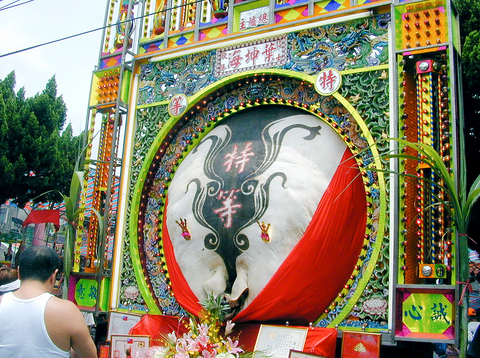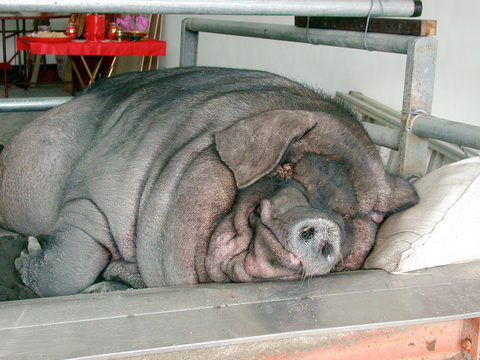The belief that "the bigger the sacrificed pig, the more luck a person will have for the rest of the year" has resulted in a lifetime of agony for hundreds of pigs, bred by farmers to become abnormally overweight before slaughter, animal-rights activists said yesterday.
Dozens of activists from several animal-rights groups yesterday gathered in front of the Council of Agriculture (COA) to protest traditional pig contests, saying the government has failed to regulate abusive practices toward animals.
Showing a documentary about pigs selected for the contest, activists said that 15 to 18 months before the overweight pigs are killed as sacrificial offerings, they are deprived of fluids, exercise and even turning over freely. The pigs undergo these cruel farming practices until their weight reaches upwards of five to six times their normal weight, activists said.

PHOTO: LIANG HSIU-HSIEN, TAIPEI TIMES
According to a recent survey by the Environment and Animal Society of Taiwan (EAST), the price for a 600kg pig is about NT$200,000 (US$6,228). And the price goes up with the weight. A 900kg pig costs about NT$3.5 million.
EAST director Chen Yu-min (
"The obesity even leaves pigs paralyzed. On hot summer days, some even die of [heat-related] sickness," Chen said.

PHOTO COURTESY OF THE ENVIRONMENT AND ANIMAL SOCIETY OF TAIWAN
The survey suggests that there are about 80 farms that raise an average of 650 pigs for such contests, and more than half of them are in Taoyuan County. In 2003, more than 30 deaths of overweight pigs in Taoyuan were reported.
Chen said some farmers even pour metal into their pigs before a contest in order to increase the swine's weight, which is why contest holders have to use metal detectors to check overweight pigs.
Chen said that pigs with thick fat are slaughtered publicly without being stunned. Butchers usually cut the throats of pigs as they are suspended upside down with their legs tightly bound. The process is often accompanied by the pigs' bloodcurdling screams. According to the Husbandry Law (畜牧法), pigs cannot be slaughtered without being stunned in advance, Chen said. However, violations of the law have been neglected by the government for a long time, he said.
In recent years, activists have launched a campaign against the pig contests. A few temples or religious groups have used "alternative pigs," which are made from flowers, fruit, rice cakes or other environmentally friendly materials.
Activists said that traditional briefs leading to animal abuse violate existing laws, but the government has rarely taken action against offenders.
Accompanied by Democratic Progressive Party Legislator Tien Chiu-chin (田秋堇), the activists were met by COA Deputy Minister Hu Fu-hsiung (胡富雄), who promised to order local authorities to try to persuade farmers to abandon cruel farming practices.
"If they keep violating the Animal Protection Law [動物保護法], the pigs will be confiscated," Hu said.

Chinese spouse and influencer Guan Guan’s (關關) residency permit has been revoked for repeatedly posting pro-China videos that threaten national security, the National Immigration Agency confirmed today. Guan Guan has said many controversial statements in her videos posted to Douyin (抖音), including “the red flag will soon be painted all over Taiwan” and “Taiwan is an inseparable part of China,” and expressing hope for expedited reunification. The agency last year received multiple reports alleging that Guan Guan had advocated for armed reunification. After verifying the reports, the agency last month issued a notice requiring her to appear and explain her actions. Guan

The Kaohsiung Tourism Bureau audited six hotels in an effort to prevent price gouging ahead of Korean band BTS’ concert tour in the city scheduled for Nov. 19, 21 and 22 this year. The bureau on Friday said that the audits — conducted in response to allegations of unfair pricing posted on social media — found no wrongdoing. These establishments included the local branches of Chateau de Chine, Hotel Nikko, My Humble House, and Grand Hai Lai, it said, adding that the Consumer Protection Commission would have penalized price gougers had the accusations been substantiated. The bureau said the Tourism Development Act

BACK TO WINTER: A strong continental cold air mass would move south on Tuesday next week, bringing colder temperatures to northern and central Taiwan A tropical depression east of the Philippines could soon be upgraded to be the first tropical storm of this year, the Central Weather Administration (CWA) said yesterday, adding that the next cold air mass is forecast to arrive on Monday next week. CWA forecaster Cheng Jie-ren (鄭傑仁) said the first tropical depression of this year is over waters east of the Philippines, about 1,867km southeast of Oluanpi (鵝鑾鼻), and could strengthen into Tropical Storm Nokaen by early today. The system is moving slowly from northwest to north, and is expected to remain east of the Philippines with little chance of affecting Taiwan,

GIVE AND TAKE: Blood demand continues to rise each year, while fewer young donors are available due to the nation’s falling birthrate, a doctor said Blood donors can redeem points earned from donations to obtain limited edition Formosan black bear travel mugs, the Kaohsiung Blood Center said yesterday, as it announced a goal of stocking 20,000 units of blood prior to the Lunar New Year. The last month of the lunar year is National Blood Donation Month, when local centers seek to stockpile blood for use during the Lunar New Year holiday. The blood demand in southern Taiwan — including Tainan and Kaohsiung, as well as Chiayi, Pingtung, Penghu and Taitung counties — is about 2,000 units per day, the center said. The donation campaign aims to boost